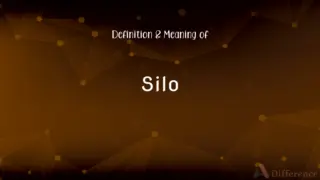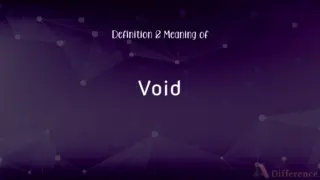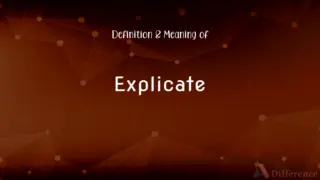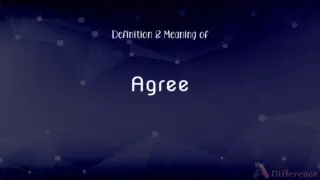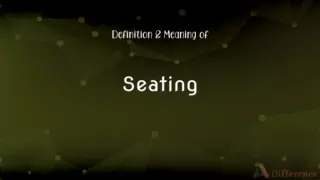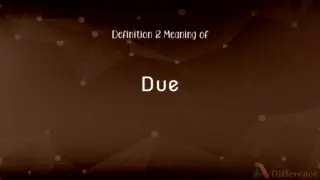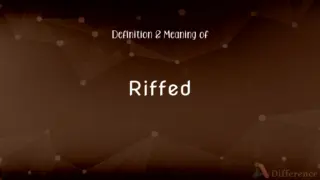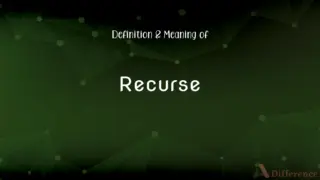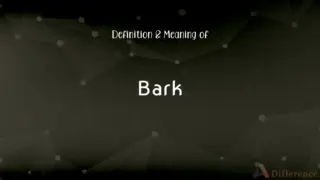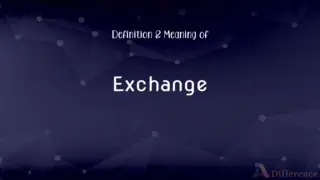Past Definition and Meaning
By Tayyaba Rehman & Maham Liaqat — Updated on March 5, 2024
Past refers to the time before the present moment. e.g., She reminisced about her adventures in the past.
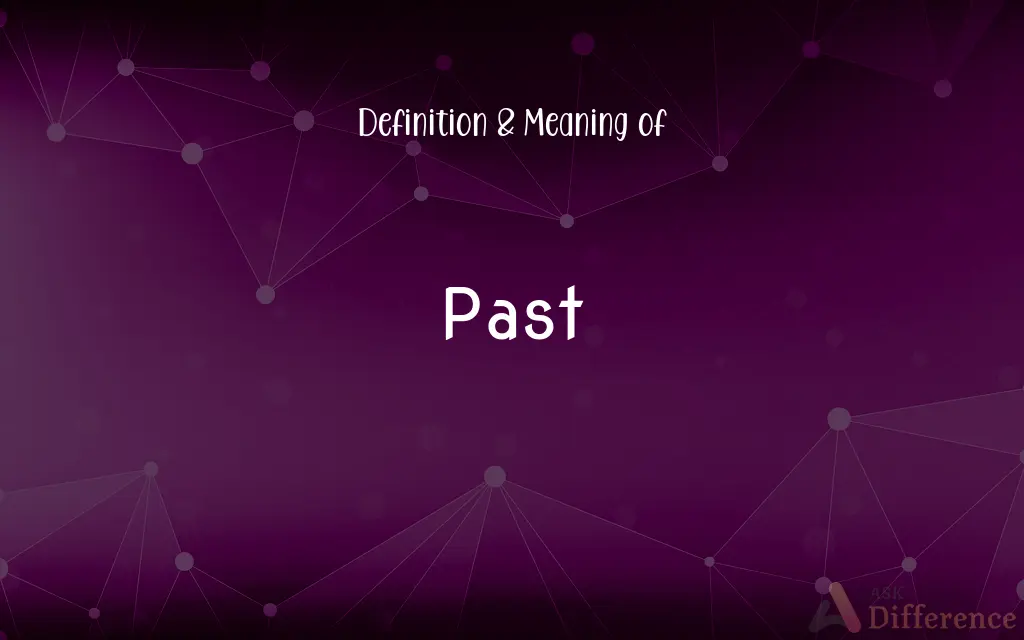
Table of Contents
Past Definitions
Used to indicate movement from one side of a point to another.
The car drove past the old barn.
In art or literature, representing a bygone era.
The novel is set in the past, during the Victorian era.
So as to pass a given point;
Every hour a train goes past
The period of time that has already happened.
Dinosaurs roamed the Earth in the distant past.
Beyond in position; further than.
She walked past the library on her way home.
History or background of a person or thing.
The castle's past is filled with intriguing stories.
No longer current; former.
The past president of the club attended the meeting.
The part of one's life that has been lived.
She tried to forget her troubled past.
Previous to; before a specified time.
The deadline was just past noon.
A grammatical term indicating action completed before the current moment.
He had finished his homework by the past evening.
Beyond the range or limit of something.
His patience was stretched past its limit.
No longer current; gone by; over
His youth is past.
Having existed or occurred in an earlier time; bygone
Past events.
In years past.
Earlier than the present time; ago
40 years past.
Just gone by or elapsed
In the past few days.
Having served formerly in a given capacity, especially an official one
A past president.
A past inmate of a cell.
(Grammar) Of, relating to, or being a verb tense or form used to express an action or condition prior to the time it is expressed.
The time before the present.
Previous background, career, experiences, and activities
An elderly person with a distinguished past.
A former period of someone's life kept secret or thought to be shameful
A family with a checkered past.
The past tense.
A verb form in the past tense.
So as to pass by or go beyond
He waved as he walked past.
Beyond in time; later than or after
Past midnight.
A quarter past two.
Beyond in position; farther than
The house is a mile past the first stoplight. They walked past the memorial in silence.
Beyond the power, scope, extent, or influence of
The problem is past the point of resolution.
Beyond in development or appropriateness
The child is past drinking from a bottle. You're past sucking your thumb, so don't do it.
Beyond the number or amount of
The child couldn't count past 20. See Usage Note at pass.
The period of time that has already happened, in contrast to the present and the future.
A book about a time machine that can transport people back into the past
(grammar) The past tense.
Having already happened; in the past; finished.
Past glories
(postmodifier) Following expressions of time to indicate how long ago something happened; ago.
Of a period of time: having just gone by; previous.
During the past year
(grammar) Of a tense, expressing action that has already happened or a previously-existing state.
Past tense
In a direction that passes.
I watched him walk past
Beyond in place or quantity
The room past mine
Count past twenty
What's the time? - It's now quarter past twelve midday (or 12.15pm).
No longer capable of.
I'm past caring what he thinks of me.
Having recovered or moved on from (a traumatic experience, etc.).
Passing by, especially without stopping or being delayed.
Ignore them, we'll play past them.
Please don't drive past the fruit stand, I want to stop there.
(obsolete) pass
Of or pertaining to a former time or state; neither present nor future; gone by; elapsed; ended; spent; as, past troubles; past offences.
A former time or state; a state of things gone by.
The present is only intelligible in the light of the past, often a very remote past indeed.
Beyond, in position, or degree; further than; beyond the reach or influence of.
Until we be past thy borders.
Love, when once past government, is consequently past shame.
Beyond, in time; after; as, past the hour.
Is it not past two o'clock?
Above; exceeding; more than.
Not past three quarters of a mile.
Bows not past three quarters of a yard long.
By; beyond; as, he ran past.
The alarum of drums swept past.
The time that has elapsed;
Forget the past
A earlier period in someone's life (especially one that they have reason to keep secret);
Reporters dug into the candidate's past
A verb tense that expresses actions or states in the past
Earlier than the present time; no longer current;
Time past
His youth is past
This past Thursday
The past year
The present leader
Articles for present use
The present topic
The present system
Present observations
A verb tense or other construction referring to events or states that existed at some previous time;
Past participle
Past Snonyms
Bygone
Belonging to an earlier time.
They reminisced about bygone days.
Historical
Relating to the past.
The museum houses historical artifacts from the region.
Former
Having previously filled a particular role or been a particular thing.
He bumped into his former teacher at the reunion.
Previous
Existing or occurring before in time or order.
She referred to the notes from the previous meeting.
Old
Dating from the remote past; ancient.
They visited the old ruins of the castle.
Earlier
Happening or existing before the event or time in question.
He recalled the events of the earlier evening.
Ancient
Belonging to the very distant past and no longer in existence.
The scholars studied ancient civilizations.
Antique
Having high value because of considerable age.
She collects antique furniture.
Outdated
Out of date; not currently in use.
The software is outdated and needs an upgrade.
Obsolete
No longer produced or used; out of date.
The typewriter is considered obsolete technology.
Past Idioms & Phrases
Past its sell-by date
Something that is outdated or no longer effective or useful.
The computer system we're using is well past its sell-by date.
Past one's bedtime
Later than the time one usually goes to bed.
It's already past my bedtime, so I need to head home.
Living in the past
Focusing too much on previous times or achievements rather than the present.
He's always talking about his high school football days, truly living in the past.
Fly past
When time seems to go by very quickly.
The summer holidays always seem to fly past.
Past master
A person who is very skilled because they have done something many times.
She's a past master at negotiating deals.
Past caring
To be indifferent because one is too disappointed or tired to care.
After all the delays, I'm past caring whether the project finishes on time or not.
Beyond the past
Looking towards future opportunities rather than being hindered by what has happened.
We need to think beyond the past to solve these issues.
A thing of the past
Something that no longer exists or is no longer relevant.
Typewriters have become a thing of the past in the digital age.
Slip past
To go unnoticed or not be caught by someone.
The thief managed to slip past the security guards.
Past recall
Too late to be changed or reversed.
The words were out and past recall, leaving everyone shocked.
Look past
To ignore something and focus on what comes after or what is more important.
You need to look past his mistakes and see his potential.
Get past
To overcome an obstacle or problem.
It took me a while to get past my fear of public speaking.
Past and gone
Something that has finished or is no longer in existence.
That opportunity is past and gone, so it's time to find a new one.
Go past
To move beyond a certain point.
Don't go past the red light without stopping.
Glide past
To move smoothly and effortlessly past something or someone.
The skater glided past the crowd with ease.
In the past
Previously; at a former time.
In the past, this area was farmland.
Let the past be the past
To forget about past disagreements or problems.
We agreed to let the past be the past and start afresh.
Sneak past
To move past someone or something quietly and unnoticed.
The cat tried to sneak past the dog sleeping in the doorway.
Brush past
To move closely past someone, often in a hurry.
In her hurry, she brushed past me without saying hello.
Get past something
To overcome an obstacle or challenge.
It took me a while to get past my fear of heights.
Sail past
To move past something or someone quickly and easily.
The new runner sailed past the others to win the race.
Skip past
To move past something quickly, often ignoring it or giving it minimal attention.
Let's skip past the introductions and get right to the main discussion.
Past its prime
No longer in the best or most effective condition.
The old factory was well past its prime.
Bring up the past
To mention or remind someone of something that happened previously.
She always brings up the past in arguments.
Past due
Overdue, especially in reference to payments.
The rent is past due, and we need to pay it immediately.
Past history
Used to indicate that something is over and should not be considered or worried about.
Let's leave our disagreements as past history and move forward.
Race past
To move past someone or something very quickly.
The cars raced past, kicking up dust behind them.
Dwell on the past
To think or talk about something from the past too much.
It's not healthy to dwell on the past so much.
Past one's prime
No longer at the peak of physical or mental ability.
The athlete admitted he was past his prime but still competitive.
Breeze past
To pass by someone or something easily and confidently.
She breezed past the interview questions without hesitation.
Past Example Sentences
He glanced at the clock and realized it was past lunchtime.
The museum displays artifacts from the past century.
Stories from the past can teach us valuable lessons.
He has moved past his initial reluctance and is now eager to start.
The teacher asked us to write about a significant event in our past.
The train had already gone past when we arrived at the station.
She jogged past me without even saying hello.
The festival celebrates traditions from the past.
She decided to leave her past behind and start anew.
They discussed the achievements and failures of past generations.
We must look past our differences and work together.
He has a tendency to dwell on the past.
The exam covered historical events from the past 100 years.
The past few days have been extremely hot.
She walked past me without noticing.
We need to learn from the past to improve our future.
Memories of the past can be both sweet and painful.
They dug into the company's past to understand its values.
She ran past the point where she usually stops.
I prefer not to dwell on the past.
We celebrated our achievements but looked forward to the future, not just the past.
Legends from the past often become part of a culture's heritage.
He often spoke of his life in the past with great fondness.
I glanced at the clock as I walked past.
The past decade has seen significant technological advancements.
The museum’s exhibits tell stories from the past.
The castle's past is shrouded in mystery.
They walked past the old school, reminiscing about their childhood.
Our past experiences shape who we are today.
He moved past his fears to achieve his goals.
Common Curiosities
Why is it called past?
It is called "past" from the Latin "passus," meaning "step" or "passed," referring to time that has gone by.
What is a stressed syllable in past?
In "past," the stressed syllable is "past."
What is the first form of past?
Past is an adjective, noun, or preposition; it does not have verb forms.
How do we divide past into syllables?
Past is divided into syllables as: past.
What is the pronunciation of past?
Past is pronounced as /pæst/.
What is the root word of past?
The root of "past" is from the Latin "passus," suggesting the idea of having gone by or stepped through.
How is past used in a sentence?
Past is used to refer to a time before the current moment, e.g., We discussed our achievements from the past year.
How many syllables are in past?
Past has one syllable.
What is the verb form of past?
Past does not have a verb form; it is primarily used as an adjective, noun, or preposition.
What part of speech is past?
Past can be an adjective, a noun, or a preposition.
What is the opposite of past?
The opposite of past is "future."
Is past a negative or positive word?
Past is neutral; its positive or negative connotation depends on the context.
Is past a vowel or consonant?
The first letter of "past," P, is a consonant.
What is another term for past?
Another term for past could be "bygone" or "former."
Is past a noun or adjective?
Past can be both a noun and an adjective, depending on its use in a sentence.
Is past a collective noun?
No, past is not a collective noun.
What is the singular form of past?
Past remains the same in singular form; it does not change.
Is past an adverb?
No, past is not typically used as an adverb.
Is the past term a metaphor?
"Past" can be used metaphorically to represent previous experiences or times gone by.
Is the word “past” a Direct object or an Indirect object?
"Past" can serve as a direct object when it is a noun, e.g., "We cannot change the past."
Which conjunction is used with past?
Conjunctions like "and," "but," or "or" can be used with "past" in a sentence.
Which article is used with past?
The definite article "the" is commonly used with "past" to refer to a specific tim
What is the plural form of past?
Past does not have a plural form; its use does not change based on number.
Is past a countable noun?
As an abstract concept, past is not typically considered a countable noun.
Is the word past imperative?
No, "past" is not used in the imperative mood.
Is the word past Gerund?
No, past is not a gerund.
Which preposition is used with past?
As a preposition itself, "past" is used to indicate movement beyond a certain point.
Is past an abstract noun?
Yes, when used as a noun, past refers to an abstract concept of time that has already happened.
Which determiner is used with past?
Determiners such as "the," "my," "your" can be used with "past" depending on the context.
Which vowel is used before past?
The vowel sound before "past" depends on the preceding word; there is no specific rule.
Share Your Discovery
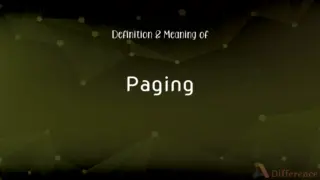
Previous Term
Paging Definition and Meaning
Next Term
Refer Definition and MeaningAuthor Spotlight
Written by
Tayyaba RehmanTayyaba Rehman is a distinguished writer, currently serving as a primary contributor to askdifference.com. As a researcher in semantics and etymology, Tayyaba's passion for the complexity of languages and their distinctions has found a perfect home on the platform. Tayyaba delves into the intricacies of language, distinguishing between commonly confused words and phrases, thereby providing clarity for readers worldwide.
Co-written by
Maham Liaqat








